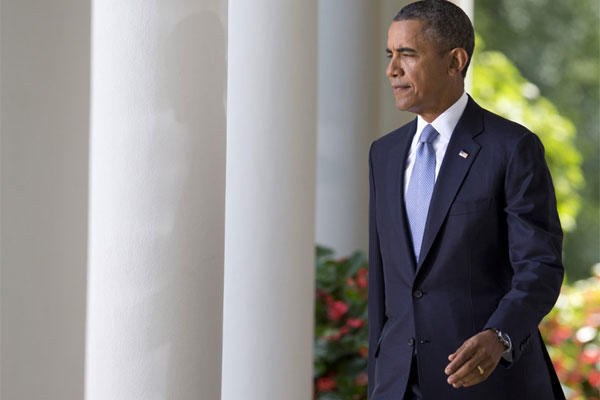Veterans' organizations that also lobby for the interests of active-duty troops say President Obama should not be looking to scale back Defense Department spending by trimming pay raises of the country's troops.
More than a week ago President Obama announced he would seek only a 1 percent pay raise for servicemembers next year, and not the 1.8 percent that it would be if Obama adhered to the federal formula intended to have federal pay keep pace with private-sector wages.
Obama, in an Aug. 30 letter to House Speaker Rep. John Boehner, cited severe economic conditions as his reason for reducing the pay raise. Obama's move comes as the government faces nearly $500 billion in budget-mandated cuts over the next 10 years, as well as $500 billion cuts forced by sequester legislation lawmakers adopted in 2011.
"We generally don't believe it's smart at all to have servicemembers and veterans bear the brunt of fiscal constraints," Iraq and Afghanistan Veterans of America Legislative Director Alex Nicholson said on Wednesday. "There are plenty of other places where cost savings could be realized and plenty of other programs across DoD."
John Stovall, national security director for The American Legion, said that 2.4 million-member organization backs the 1.8 percent tied to the formula worked out by the Employment Cost Index of the Labor Department.
"And in our opinion the all-volunteer force is the backbone of the national defense, and we have to make sure we attract and keep the right people," he said.
A 1.8 percent increase would have been a shade more than troops got a year ago, when Obama signed the 2013 budget that granted a 1.7 percent raise.
While the veterans groups are ready to give voice to troops' opposition to the cuts, all sides should expect the Pentagon to remain quiet. In early August, Deputy Secretary of Defense Ashton B. Carter made it clear to Congress that DoD wants to slow the growth in personnel costs, which he said accounts for half of DoD's budget.
Limiting both military and DoD civilian pay was one recommendation, he said.
Though Congress passed a law requiring federal pay to keep pace with private-sector pay more than 20 years ago, provisions within the statute have enabled presidents to reduce any formula-based increase. Justifications for a lower increase are a national emergency or severe economic conditions.
President George W. Bush lowered a planned federal pay raise for civilian workers after the 9/11 attacks, though military increases were allowed. Following the financial market-spurred crash, President Obama trimmed what was going to be a 2.4 percent military pay increase for 2010 to 2 percent.
Joe Davis, spokesman for the Veterans of Foreign Wars, is not surprised that servicemembers are taking the haircut on pay. People are soft targets if it comes to a choice of cutting them or bases and businesses for which there are powerful interests.
"The Pentagon cannot shutter CONUS installations without congressional approval, and it resists to the 'nth' degree cancelling or tweaking weapons modernization programs for obvious reasons," Davis said in an email to Military.com. "That leaves personnel accounts."
Nicholson of IAVA said that personnel cuts are attractive to the Pentagon "because small cuts [there] mean large savings over time."
"But we don't think it's wise at all from a policy standpoint, from a principle standpoint or from a moral standpoint that those in uniform and shouldering the nation's defense to bear the costs to t heir compensation, even if it is a difference of only 0.8 percent," he said.
Even if the request for the cut originates with the Pentagon -- as indicated by Carter's testimony -- Obama has a personal responsibility to the men and women in uniform, Nicholson said.
"We would expect him to see the absurdity of that request from the Pentagon as soon as it came across his desk, or the desk of his staff," he said. "He's still the commander-in-chief. He can't deflect criticism just because the request came from [DoD]."
"This is one area where he should have said no," Nicholson said.




























